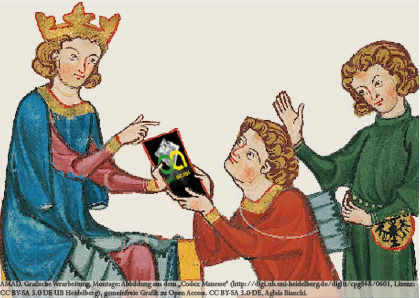AMAD
„Archivum Medii Aevi Digitale - Interdisziplinäres Open-Access-Fachrepositorium und Wissenschaftsblog für Mittelalterforschung‟Zur Einreichung

Langanzeige der Metadaten
| DC Element | Wert | Sprache |
|---|---|---|
| Autor*in | Thorton, K. | - |
| Autor*in | Phillips, C.B. | - |
| Datum | 2009 | - |
| Quelle | https://doi.org/10.1136/jmh.2009.001693 | - |
| Quelle | http://worldcatlibraries.org/registry/gateway?version=1.0&url_ver=Z39.88-2004&rft_val_fmt=info:ofi/fmt:kev:mtx:journal&atitle=Performing+the+good+death:+the+medieval+Ars+moriendi+and+contemporary+doctors&title=Medical+Humanities+&volume=35&issue=2&date=2009-12&au=Thorton,+K.;+Phillips,+C.B. | - |
| Quelle | http://timetravel.mementoweb.org/memento/2009/http://mh.bmj.com/content/35/2.toc | - |
| Quelle | http://hdl.handle.net/10822/1026166 | - |
| URI | https://www.amad.org/jspui/handle/123456789/73655 | - |
| Beschreibung | Death is inevitable, but dying well is not. Despite the role of medical professionals as overseers of dying in contemporary society, there is comparatively little discourse among doctors about the constituents of a good death. In the 15th century, by contrast, the Ars moriendi portrayed normative medieval ideas about good and bad deaths. At a time when dying could be viewed as a performed battle against damnation, the Ars moriendi codified a set of moral precepts that governed the expression of autonomy, relations between the dying and the living and orientation towards God. In these images, dying well is a moral activity that results from active decisions by the dying person to turn from earthly preoccupations to contemplation of, and submission to, the divine. It is likely in contemporary society that there is a range of understandings of the "good death". While attitudes to personal autonomy may differ, reflectiveness and dying at home in the presence of family (expressed in the Ars moriendi), remain part of many modern notions of the good death. We argue that medical institutions continue to construct death as a performed battle against physical debility, even when patients may have different views of their preferred deaths. The dialectic approach of the Ars moriendi may offer a way for contemporary doctors to reflect critically on the potential dissonance between their own approach to death and the variety of culturally valorised "good deaths". | - |
| Format | Article | - |
| Sprache | eng | - |
| Schlagwörter | Value / Quality of Life | - |
| Schlagwörter | Attitudes Toward Death | - |
| Schlagwörter | Care of the Dying Patient | - |
| Schlagwörter | Attitudes | - |
| Schlagwörter | Autonomy | - |
| Schlagwörter | Death | - |
| Schlagwörter | Doctors | - |
| Schlagwörter | Patients | - |
| Schlagwörter | Personal Autonomy | - |
| Dewey-Dezimalklassifikation | 940 | - |
| Titel | Performing the Good Death: The Medieval Ars Moriendi and Contemporary Doctors | - |
| AMAD ID | 569105 | - |
| Jahr | 2009 | - |
| Open Access | 2 | - |
| Enthalten in den Sammlungen: | BASE (Bielefeld Academic Search Engine) General history of Europe | |
Dateien zu dieser Ressource:
Es gibt keine Dateien zu dieser Ressource.
Alle Ressourcen in diesem Repository sind urheberrechtlich geschützt, soweit nicht anderweitig angezeigt.

